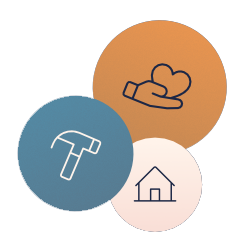Problemas principales para la reconstrucción de Los Angeles
Las personas afectadas por los incendios de Eaton y Palisades compartieron lo que es más importante para ellos. Lo que escuchamos dio forma al diseño de las deliberaciones de la comunidad.
Lo que hicimos
La fase de programación de la agenda para esta participación comenzó en marzo y duró hasta el 16 de mayo de 2025. Los participantes compartieron de forma voluntaria sus pensamientos sobre la recuperación de los incendios forestales de Los Ángeles. La información recopilada orientará el modo en que los funcionarios públicos avanzarán.
Lo que aprendimos también guiará la siguiente fase de este compromiso: la deliberación.
Las ideas y las perspectivas que hemos obtenido hasta ahora son muy valiosas.
Lo que escuchamos
Pedimos a los participantes que calificaran la importancia de 10 temas relacionados con las catástrofes. Los participantes utilizaron una escala de 5 puntos para hacernos saber cuán importante es hablar de cada tema más a fondo. La siguiente tabla muestra que el porcentaje de las personas que dijeron que un tema es "muy importante" o "esencial".
Seleccione un tema para explorar los comentarios y ver información sobre las conversaciones.
Cómo estamos respondiendo a las necesidades de la comunidad
Los residentes compartieron sus necesidades más urgentes para la recuperación y reconstrucción de sus comunidades. Observamos que algunos temas requieren mayor debate. Sin embargo, también encontramos problemas sobre los que podemos actuar ahora.
A continuación se muestra un resumen de cómo estamos respondiendo a lo que los residentes dijeron que más necesitan.
Pronto agregaremos más actualizaciones sobre nuestro progreso.
A continuación: Hablar sobre problemas complejos
Si bien estamos dispuestos a adoptar medidas respecto de las prioridades mencionadas anteriormente, aún queda trabajo por hacer en otras cuestiones. Invitaremos a los residentes de California a colaborar con nosotros.
Los residentes compartieron ideas sobre desafíos complejos de la comunidad que necesitan explorase más a fondo. Estos problemas no tienen una solución simple. Pueden requerir decisiones complicadas que las comunidades deben tomar juntas.
La siguiente fase, la deliberación, es donde abordaremos estos temas más complejos. La deliberación permitirá a los miembros de la comunidad a:
- Alinearse y encontrar la dirección correcta para seguir adelante.
- Explorar las diferentes opiniones de manera respetuosa.
- Considerar los beneficios y desventajas de las distintas propuestas.
Nuestro objetivo final es crear planes de acción que los miembros de la comunidad puedan apoyar y sentirse incluidos.
“Los propietarios de viviendas deberían poder utilizar gas natural. Es más confiable y asequible que todos los requerimientos eléctricos”.
“Todas las viviendas deberían construirse sin instalación para gas. Se supone que para 2035, todos los sistemas de energía en Los Ángeles deben ser eléctricos... entonces, ¿por qué invertir en reparar infraestructura de gas que pronto quedará obsoleta o no se utilizará?”
“Los propietarios de viviendas deberían poder utilizar gas natural. Es más confiable y asequible que todos los requerimientos eléctricos”.
“Todas las viviendas deberían construirse sin instalación para gas. Se supone que para 2035, todos los sistemas de energía en Los Ángeles deben ser eléctricos... entonces, ¿por qué invertir en reparar infraestructura de gas que pronto quedará obsoleta o no se utilizará?”
Cómo hicimos el análisis
Utilizamos el modelo de inteligencia artificial generativa Claude 3.5 Sonnet para ayudar a encontrar temas y tendencias en los comentarios. Le dimos indicaciones al modelo para que nos ayude a comprender lo que pensaba la gente. Esta fue una manera eficiente de ver cómo la gente estaba de acuerdo o en desacuerdo sobre temas importantes.
Revisamos diferentes formas de escribir las indicaciones. Nos enfocamos en las respuestas que surgieron con frecuencia, independientemente de cómo hicimos las preguntas.
Ejemplos de indicaciones
“Me gustaría que analizaras un conjunto de respuestas de una encuesta cualitativa utilizando el pensamiento extendido”.
“Comienza haciendo una exploración inicial de los datos: primero, lee todo el conjunto de datos sin categorizar ni etiquetar. Toma nota de tus observaciones e impresiones inmediatas sobre lo que te llama la atención. Identifica palabras, frases y sentimientos recurrentes que aparecen en múltiples respuestas. Comparte lo que te sorprendió o lo que te llamó la atención en esta revisión inicial”.






